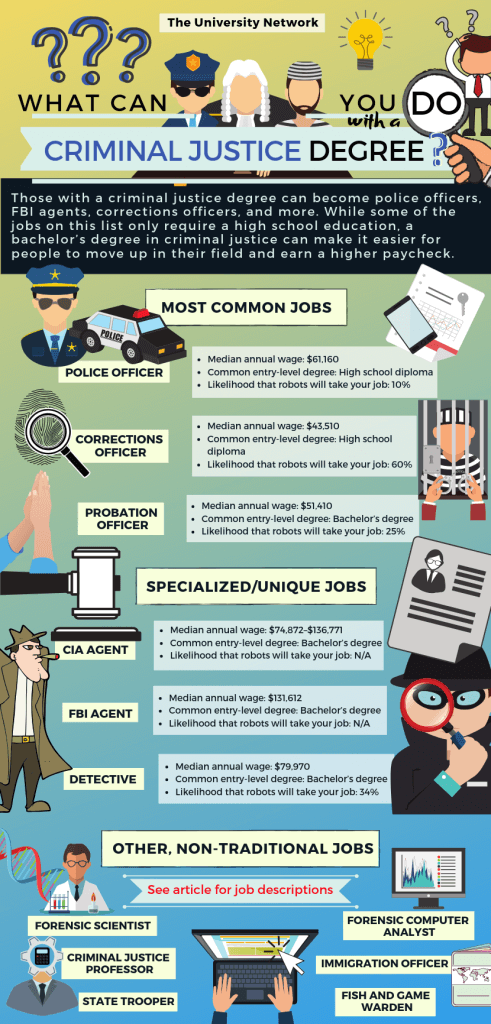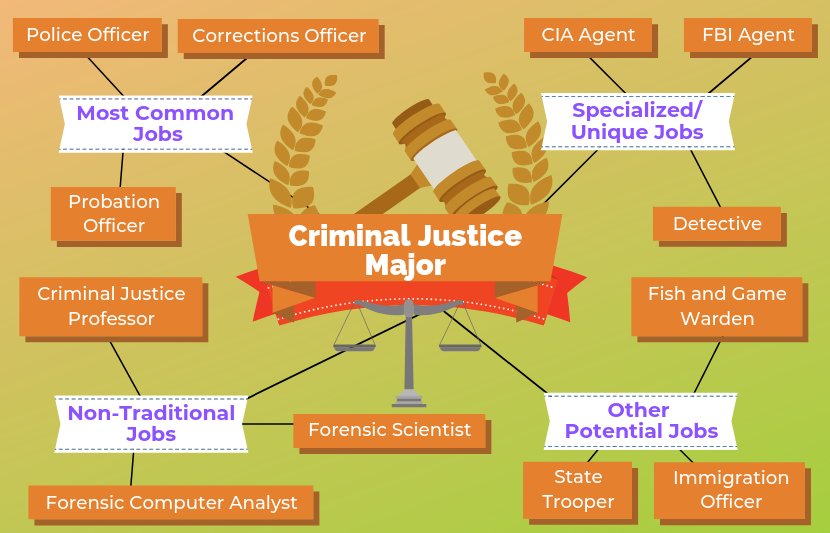A degree in criminal justice is best fit for those who are interested in establishing and maintaining order and justice. Those with the degree can become police officers, FBI agents, corrections officers, fish and game wardens, and more. While some of the jobs on this list only require a high school education, a bachelor’s degree in criminal justice can make it easier for people to move up in their field and earn a higher paycheck.
Here’s a list of 12 possible jobs for criminal justice majors:
Most Common Jobs For Criminal Justice Majors
1. Police Officer
Police officers serve to protect communities by working to prevent and mitigate crime. Technically, a high school diploma is the only educational requirement to become a police officer, but those who choose to attend college and major in criminal justice may have a greater possibility to receive higher pay and be promoted. Although the job doesn’t require much traditional education, police officers have to go through extensive training, which is most commonly offered at police academies.
Median annual wage: $61,160
Common entry-level degree: High school diploma
Likelihood that robots will take your job: 10%
2. Corrections Officer
Corrections officers are responsible for overseeing, supervising and assisting those who have been charged or convicted of a crime. They can work in holding facilities or prisons at the local state and federal levels. Aspiring corrections officers don’t need a college degree, as most of their necessary training is taught to them on the job. However, a degree in criminal justice could make it easier for corrections officers to be promoted and earn a higher paycheck. Typically, conversation and mitigation skills are key for this profession. In addition to their role as overseers, corrections officers may have to do some counseling or social work with detainees.
Median annual wage: $43,510
Common entry-level degree: High school diploma
Likelihood that robots will take your job: 60%
3. Probation Officer
Probation officers are tasked with making sure people who have been released from prison can mold back into society without repeat offending. They check in on parolees, conduct interviews and find them help, if need be. If a parolee runs away or violates the terms of his or her parole, probation officers are often responsible for tracking them down. Typically, to earn a job as a probation officer, a degree in criminal justice, social work or counseling is necessary.
Median annual wage: $51,410
Common entry-level degree: Bachelor’s degree
Likelihood that robots will take your job: 25%

Specialized, Unique Jobs for Criminal Justice Majors
4. CIA Agent
CIA agents have the responsibility of helping the federal government investigate international crimes. Compared to other criminal justice jobs, there are many advantages to being a CIA agent, including higher pay and prestige, but CIA agents don’t always get to choose where they live. They have to report to specific bases, which can be overseas. To become a CIA agent, a bachelor’s degree in criminal justice, forensics or criminology, along with at least 3 years of criminal investigation experience, is needed.
Median annual wage: $74,872–$136,771
Common entry-level degree: Bachelor’s degree
Likelihood that robots will take your job: N/A
5. FBI Agent
FBI agents are tasked with solving major domestic crime, including terrorism, organized crime, major theft and civil rights crimes, among others. Because they are near the pinnacle of the U.S. criminal justice system, a bachelor’s degree, along with extensive hours of academic and tactical training, are needed before aspiring FBI agents can earn a job. The FBI is in need of a diverse set of people, so, in addition to hiring people with criminal justice backgrounds, the FBI hires people with experience in law, finance and education, among others.
Median annual wage: $131,612
Common entry-level degree: Bachelor’s degree
Likelihood that robots will take your job: N/A
6. Detective
Detectives typically work for local and state police forces and investigate crimes by gathering and analyzing evidence. They may be tasked with interviewing suspects, examining archived records and making arrests. Typically, aspiring detectives need to be versed in law, especially in regards to civilian rights. While they aren’t always necessary, most detectives have a bachelor’s degree in criminal justice, criminology or something related to law. Almost always, detectives start as police officers.
Median annual wage: $79,970
Common entry-level degree: Bachelor’s degree
Likelihood that robots will take your job: 34%
Non-Traditional Jobs for Criminal Justice Majors
7. Forensic Scientist
Forensic scientists assist criminal investigations by collecting and analyzing physical evidence, such as blood splatters, fingerprints, DNA, tissue, or spent shell casings. This line of work may include on-site evidence collection or working in a laboratory; some forensic scientists are involved in every part of evidence collection and analysis, others might work primarily or entirely in a crime lab. Oftentimes, forensic scientists will be called into trial to testify as expert witnesses on evidence or lab techniques. A bachelor’s degree with coursework in forensic science and related areas of study like toxicology, pathology, or DNA can be enough to find entry-level employment in the field.
Median annual wage: $57,850
Common entry-level degree: Bachelor’s degree
Likelihood that robots will take your job: 1%
8. Criminal Justice Professor
After years working for a police force, prison or government agency, some criminal justice majors go on to teach in higher education. Patience, communication, organization and enthusiasm are some of the most important characteristics of a good college professor. To earn a job teaching at the post-secondary level, a master’s degree (and sometimes a doctorate degree) is required. In addition to teaching, some college professors also conduct research and write scholarly articles.
Median annual wage: $81,580
Common entry-level degree: Master’s degree
Likelihood that robots will take your job: 34%
9. Forensic Computer Analyst
Forensic computer analysts work in conjunction with law enforcement to investigate cyber crimes and to analyze computers that may have been involved in a crime. Forensic computer analysts are often involved in recovering data or documents and investigating a computer’s web history for evidence that might assist in an investigation. In addition to education in criminal justice, a bachelor’s degree in computer science is a common requirement for the position. Some agencies may require certification provided by either the International Society of Forensic Computer Examiners (ISFCE) or the International Association of Computer Investigative Specialists (IACIS).
Median annual wage: $57,850
Common entry-level degree: Bachelor’s degree
Likelihood that robots will take your job: 1%
Other Potential Jobs for Criminal Justice Majors
10. State Trooper
It is well known that state troopers monitor the highways to pull over cars that are speeding, have a burnt-out light or are missing a license plate, but that isn’t their only responsibility. State troopers also have to keep an eye out for, and in some cases, track down, wanted criminals or terrorists fleeing from a crime or their parole. Similar to police officers, a high school diploma is the only degree needed to become a state trooper, but those with a bachelor’s degree in criminal justice or a related field may be able to earn a higher salary.
Median annual wage: $61,160
Common entry-level degree: High school diploma
Likelihood that robots will take your job: N/A
11. Immigration Officer
Immigration officers are tasked with safeguarding national borders and tracking down and deporting people that are in the United States illegally. After completing their bachelor’s degree in criminal justice, criminology or a related field, aspiring immigration officers have to attend training typically at the U.S. Citizenship and Immigration Services (USCIS) training facility in Dallas, Texas.
Median annual wage: $56,910
Common entry-level degree: Bachelor’s degree
Likelihood that robots will take your job: N/A
12. Fish and Game Warden
Fish and game wardens work in protected outdoor conservation areas, such as state and national parks and forest preserves, to protect wildlife and enforce fishing, hunting and boating laws, among others. In addition to criminal justice education, aspiring fish and game wardens should have experience and knowledge of wildlife or biology. To earn a job as a fish and game warden, internships or apprenticeships are almost always necessary.
Median annual wage: $56,410
Common entry-level degree: Associate’s degree
Likelihood that robots will take your job: 8%
10 Famous People Who Studied Criminal Justice
- Freda Adler, educator
- Dan Aykroyd, actor
- R. Lee Ermey, actor
- Brad Fritsch, professional golfer
- Jenny Kwan, politician
- Henry Lee, scientist
- Michael Oher, professional football player
- Pauley Perrette, actress
- Ronald Rice, politician
- Scott Stringer, politician
To explore options for other majors, click here.



